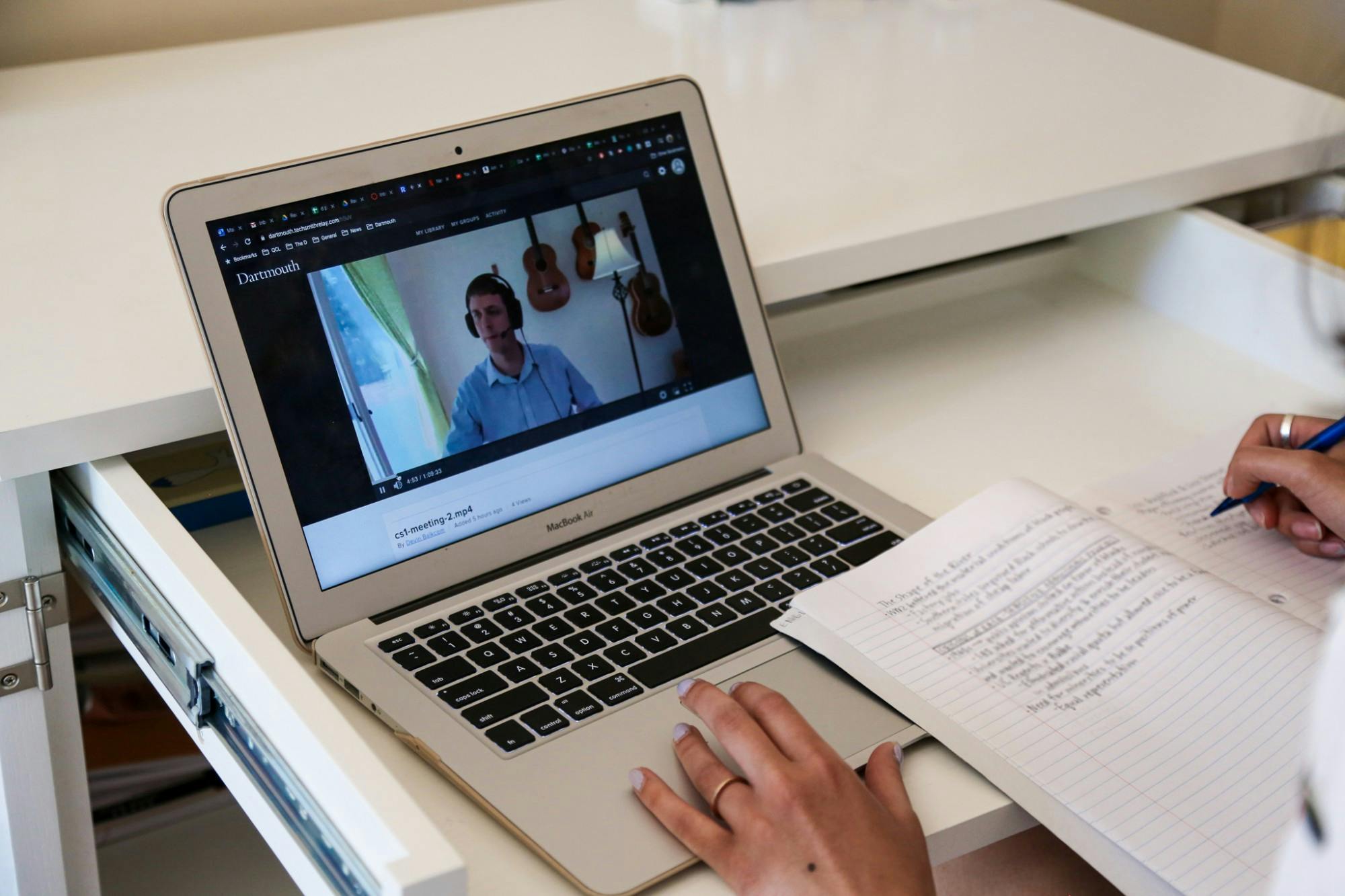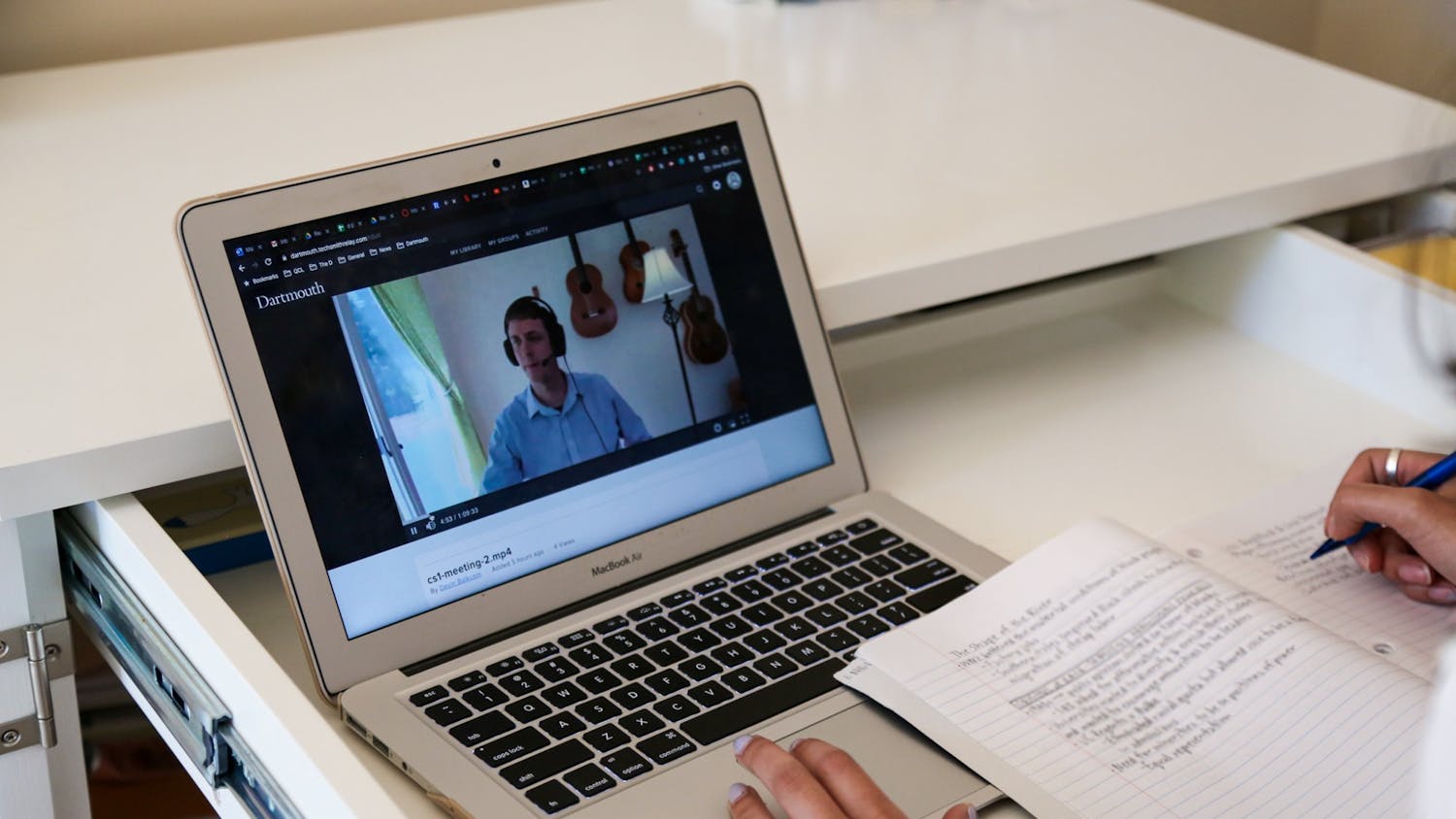Dartmouth, like many other colleges and universities, has responded to the global spread of COVID-19 by transitioning to remote instruction for all spring term classes. As the first week of classes draws to a close, many professors and students have said they were satisfied with their remote classes, though a number of students experienced complications.
Faculty have chosen to conduct classes primarily using the video conferencing software Zoom. Some courses have also utilized other applications, including Canvas, Dropbox, Adobe Creative Suite and Slack, according to vice president of information, technology and consulting Mitchel Davis.
The transition to Zoom and other digital platforms allowed professors to choose between holding classes synchronously or asynchronously — maintaining or omitting the “live” class meeting component.
Sky Miklus ’22 said that they were pleased with the transition to Zoom. In fact, Miklus said asynchronous learning allowed them to take classes for their second major that otherwise would have conflicted.
“I decided to do a second major so late, so when I was signing up for classes in the spring, I realized I needed to pick between one of these basic level classes that I need,” Miklus said. “Now those classes are asynchronous, and there is no time conflict. It’s just a nice way to take advantage of this situation.”
They added that their first day of class went smoothly, despite occasional difficulties. For example, one of their larger classes met at the designated time slot, and the volume of people caused audio lags.
“The professor kept cutting out,” they said. “But I was still satisfied with my classes. I think professors are still learning how to use [Zoom].”
English professor Ivy Schweitzer said that she views virtual learning as an opportunity to be more “intentional” with her teaching. She explained that some of her students do not have the bandwidth to stream video and audio, and consequently opt for just audio.
“I think we sometimes in class make the assumption that if we can see a student and they’re not falling asleep or totally confused, it’s okay,” Schweitzer said. “But maybe we need to be more intentional about checking in with students. I can’t even see all their faces, so it’s important to keep checking in.”
As the College transitioned to a credit/no credit system of grading, professors had considerable leeway in setting the minimum requirements needed to obtain credit for a course.
Professors have set varying bars for a passing grade. While some have chosen to set the minimum for passing at a 60 or 70 percent, Emily McConnell ’22 said one of her professors set the minimum passing grade for the course at an 80 percent, or a B- on Dartmouth’s standard grading scale. She said that the high minimum has caused her some anxiety, although she expects most students will still be able to pass.
“If I have below a B- … I can’t even receive credit, which doesn’t seem to match the College’s goal with the [credit/no credit] system of reducing stress and making the playing field more equitable for students in a variety of circumstances,” McConnell said, adding “I’m assuming most [professors] won’t fail people unless they put in little effort.”
Kay Vuong ’22, who lives in Vietnam, said the time zone difference has required large changes in her sleeping schedule. She said that she must wake up at 3:00 a.m. to attend one of her synchronous lectures held during the 2A period.
“My professors in smaller seminar classes have been very accommodating, but one of my classes is a really big lecture,” she said. “Right now, I keep getting super sleepy at the weirdest hours because my body is still adjusting to a new sleeping schedule.”
Vuong added that student visas typically stipulate that international students must take classes throughout the school year, so most were not able to take the spring term off. For students in unstable situations, keeping up with courses may prove difficult.
“The thing with how Vietnam is handling the virus is that … they’re quarantining masses of people and enforcing very strict rules,” she said. “My friends in quarantine [in government facilities] … have to function on a military schedule, like getting up at 6:00 a.m. and sleeping by 10:00 p.m., and that clashes with their classes and schoolwork.”
Other aspects of education have also adapted to remote instruction, including drill sessions, a signature aspect of Dartmouth language classes.
Katelyn Zeser ’22 said that language departments have trained drill instructors to teach drill virtually. In about a week, students across language departments will return to drill via Zoom. Zeser, who teaches Arabic drill, said that she expects there to be a gradual transition period.
“The drillees will have to grow accustomed to everyone else coming in and out of their ear,” she said. “A big issue, as well, for languages like Arabic and Hebrew is that a lot of sounds are hard to hear. But we’re really trying to not get rid of something good just because it isn’t perfect. As long as they’re practicing speaking, even if the pronunciation isn’t perfect, they’re making progress.”
Several classes in science departments were able to maintain a cohort of learning fellows and continue laboratory exercises, according to Sophia Miller ’22. She said that her chemistry class, CHEM 51, “Organic Chemistry,” will continue to require completion of laboratory exercises in order to pass. However, she added that virtual learning will expedite labs that usually involve lengthy experiments.
While labs for the course will not start until next week, Miller said her impression is that students will be provided with explanations of experiments or procedures and then will be supplied with data, allowing them to do calculations without actually executing the experiment.
Miller added that her professor is providing access to a free online textbook — an option that alleviates financial and time constraints that students may have otherwise faced.
Even art classes have been able to transition effectively, studio art professor Jack Wilson said. He explained that students in his SART 15, “Drawing 1” class will upload photos of their artwork to Canvas discussion boards. He added that the studio art department also bought and shipped materials to students with limited access to them.
However, not all class models, especially those that place emphasis on community involvement or collaboration, were able to transition to Zoom.
LATS 37, “Migrant Lives and Labor in the Upper Valley,” which typically involves collaborative projects with migrant dairy farmers, was canceled, according to Spanish professor Israel Reyes. Reyes and fellow Spanish professor Douglas Moody attempted to establish a system of online video conferencing between the students and farmers, but when Vermont issued a stay-at-home order, they were unable to carry out the course, Reyes said.
“It was impossible for me to go to the farm and engage with the farmworkers,” Reyes said. “I could have conducted the course just with the students, but it wouldn’t have fulfilled its main objective.”
Despite the changes, students have expressed optimism about the rest of the online term. Vuong stressed that the College has generally been accommodating of students in various circumstances. As a studio art major, she said that her professors ordered materials necessary for certain projects and shipped them to her in Vietnam.
“I feel really good about this term,” she said. “I’m on a massive amount of financial aid, which really requires me to maintain a high [grade point average]. The [credit/no credit] system relieves a lot of stress, and my professors have been so helpful.”




